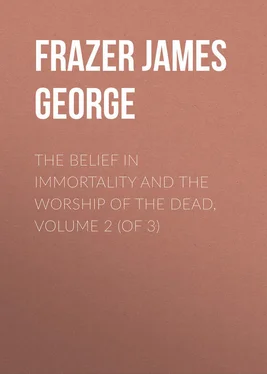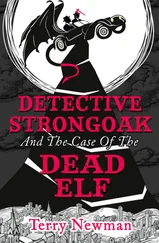James Frazer - The Belief in Immortality and the Worship of the Dead, Volume 2 (of 3)
Здесь есть возможность читать онлайн «James Frazer - The Belief in Immortality and the Worship of the Dead, Volume 2 (of 3)» — ознакомительный отрывок электронной книги совершенно бесплатно, а после прочтения отрывка купить полную версию. В некоторых случаях можно слушать аудио, скачать через торрент в формате fb2 и присутствует краткое содержание. Жанр: foreign_antique, foreign_prose, на английском языке. Описание произведения, (предисловие) а так же отзывы посетителей доступны на портале библиотеки ЛибКат.
- Название:The Belief in Immortality and the Worship of the Dead, Volume 2 (of 3)
- Автор:
- Жанр:
- Год:неизвестен
- ISBN:нет данных
- Рейтинг книги:3 / 5. Голосов: 1
-
Избранное:Добавить в избранное
- Отзывы:
-
Ваша оценка:
- 60
- 1
- 2
- 3
- 4
- 5
The Belief in Immortality and the Worship of the Dead, Volume 2 (of 3): краткое содержание, описание и аннотация
Предлагаем к чтению аннотацию, описание, краткое содержание или предисловие (зависит от того, что написал сам автор книги «The Belief in Immortality and the Worship of the Dead, Volume 2 (of 3)»). Если вы не нашли необходимую информацию о книге — напишите в комментариях, мы постараемся отыскать её.
The Belief in Immortality and the Worship of the Dead, Volume 2 (of 3) — читать онлайн ознакомительный отрывок
Ниже представлен текст книги, разбитый по страницам. Система сохранения места последней прочитанной страницы, позволяет с удобством читать онлайн бесплатно книгу «The Belief in Immortality and the Worship of the Dead, Volume 2 (of 3)», без необходимости каждый раз заново искать на чём Вы остановились. Поставьте закладку, и сможете в любой момент перейти на страницу, на которой закончили чтение.
Интервал:
Закладка:
They acknowledged that the tooas or lower order of people had minds or souls; but they firmly believed that these vulgar souls died with their bodies and consequently had no future existence. In this aristocratic opinion the generality of the commoners acquiesced, though some were vain enough to think that they had souls like their betters, and that they would live hereafter in Bolotoo. But the orthodox Tongan doctrine restricted immortality to chiefs and their ministers (the matabooles ); at most, by a stretch of charity, it extended the privilege to the mooas or third estate; but it held out no hope of salvation to tooas , who formed the fourth and lowest rank of society. 219 219 W. Mariner, op. cit. i. 419, ii. 99, 128 sq.
Mariner's account, which I have followed, of the sharp distinction which the Tongans drew between the immortality of chiefs and the mortality of common people is confirmed by the testimony of other and independent observers. According to Captain Cook, while the souls of the chiefs went immediately after death to the island of Boolootoo (Bolotoo), the souls of the lower sort of people underwent a sort of transmigration or were eaten by a bird called loata , which walked upon their graves for that purpose. 220 220 Captain James Cook, Voyages , v. 423.
The first missionaries, who landed in Tongataboo in 1797, report that the natives "believe the immortality of the soul, which at death, they say, is immediately conveyed in a very large fast-sailing canoe to a distant country called Doobludha, which they describe as resembling the Mahometan paradise. They call the god of this region of pleasure Higgolayo, and esteem him as the greatest and most powerful of all others, the rest being no better than servants to him. This doctrine, however, is wholly confined to the chiefs, for the tooas (or lower order) can give no account whatever; as they reckon the enjoyments of Doobludha above their capacity, so they seem never to think of what may become of them after they have served the purposes of this life." 221 221 Captain James Wilson, Missionary Voyage to the Southern Pacific Ocean , pp. 278 sq.
One of these first missionaries was a certain George Veeson, who had been a bricklayer before he undertook to convert the heathen to Christianity. Wearying, however, of missionary work, he deserted his brethren and betook himself to the heathen, among whom he lived as one of them, adopting the native garb, marrying native women, and eagerly fighting in the wars of the natives among themselves. In this way he acquired a considerable knowledge of the Tongan language and customs, of which he made some use in the account of his experiences which he published anonymously after his return to England. Speaking of Tongan ideas concerning the immortality of the soul he says that he heard the chiefs speak much of Bulotu (Bolotoo). "Into this region, however, they believed none were admitted but themselves. The Tuas, or lower class, having no hope of sharing such bliss, seldom speculate upon a futurity, which to them appears a subject lost in shadows, clouds, and darkness." 222 222 Quoted by Miss Sarah S. Farmer, Tonga and the Friendly Islands , p. 131. As to Veeson, see id. pp. 78, 85 sqq. The title of his book is given (p. 87) as Authentic Narrative of a Four Years' Residence in Tongataboo (London: Longman & Co., 1815). I have not seen the book. The man's name is given as Vason by (Sir) Basil Thomson in his Diversions of a Prime Minister (Edinburgh and London, 1894), pp. 326, 327, 329, 331; but his real name seems to have been George Veeson. See Captain James Wilson, Missionary Voyage to the Southern Pacific Ocean , pp. 6, 230.
The missionaries reported to Commodore Wilkes that the spirits of all chiefs were supposed to go to Bolotoo, while the souls of poor people remained in this world to feed upon ants and lizards. 223 223 Charles Wilkes, Narrative of the United States Exploring Expedition , iii. 22.
With regard to the fate of the soul after death, the Tongans universally and positively believed in the existence of a great island, lying at a considerable distance to the north-west, which they considered to be the abode of their gods and of the souls of their dead nobles and their ministers (the matabooles ). This island they supposed to be much larger than all their own islands put together, and to be well stocked with all kinds of useful and ornamental plants, always in a high state of perfection, and always bearing the richest fruits and the most beautiful flowers according to their respective natures; they thought that when these fruits or flowers were plucked, others immediately took their place, and that the whole atmosphere was filled with the most delightful fragrance that the imagination can conceive, exhaled from these immortal plants. The island, too, was well stocked with the most beautiful birds, of all imaginable kinds, as well as with abundance of hogs; and all of these creatures were immortal, except when they were killed to provide food for the gods. But the moment a hog or a bird was killed, another live hog or bird came into existence to supply its place, just as happened with the fruits and flowers; and this, so far as they could ascertain, was the only way in which plants and animals were propagated in Bolotoo. So far away was the happy island supposed to be that it was dangerous for living men to attempt to sail thither in their canoes; indeed, except by the express permission of the gods, they could not find the island, however near they might come to it. They tell, however, of a Tongan canoe which, returning from Fiji, was driven by stress of weather to Bolotoo. The crew knew not the place, and being in want of provisions and seeing the country to abound in all sorts of fruits, they landed and proceeded to pluck some bread-fruit. But to their unspeakable astonishment they could no more lay hold of the fruit than if it were a shadow; they walked through the trunks of the trees and passed through the substance of the houses without feeling any shock or resistance. At length they saw some of the gods, who passed through the men's bodies as if they were empty space. These gods recommended them to go away immediately, as they had no proper food for them, and they promised them a fair wind and a speedy passage. So the men put to sea, and sailing with the utmost speed they arrived at Samoa, where they stayed two or three days. Thence, again sailing very fast, they returned to Tonga, where in the course of a few days they all died, not as a punishment for having been at Bolotoo, but as a natural consequence, the air of that place, as it were, infecting mortal bodies with speedy death. The gods who dwell in Bolotoo have no canoes, not requiring them; for if they wish to be anywhere, there they are the moment the wish is felt. 224 224 W. Mariner, Tonga Islands , ii. 101-103.
It is said that in order to people Bolotoo the god Hikuleo used to carry off the first-born sons of chiefs and other great men, whom he transported to the island of the gods. To such lengths did he go in this system of abduction that men on earth grew very uneasy. Their ranks became thinner and thinner. How was all this to end? At last the other gods were moved to compassion. The two gods Tangaloa and Maui laid hold of brother Hikuleo, passed a strong chain round his waist and between his legs, and then taking the chain by the ends they fastened one of them to the sky and the other to the earth. Thus trussed up, the deity still made many attempts to snatch away first-born sons; but all his efforts were thwarted and baffled by the chain, for no sooner did he dart out in one direction, than the chain pulled him back in another. According to another, or the same story, the excursions of the deity were further limited by the length of his tail, the end of which was tethered to the cave in which he resided; and though the tail was long and allowed him a good deal of rope, do what he would, he could not break bounds or obtain more than a very partial view of what was going on in the rest of the world. 225 225 Sarah S. Farmer, Tonga and the Friendly Islands , pp. 132 sq. As to Hikuleo and his long tail, see also Charles Wilkes, Narrative of the United States Exploring Expedition , iii. 23, "Hikuleo is the god of spirits, and is the third in order of time; he dwells in a cave in the island. Bulotu is most remarkable for a long tail, which prevents him from going farther from the cave in which he resides than its length will admit of." Here the god Hikuleo appears to be confused with the island of Bulotu (Bulotoo) in which he resided. Tradition wavers on the question whether Hikuleo was a god or goddess, "but the general suffrage seems in favour of the female sex." See E. E. V. Collocot, "Notes on Tongan Religion," Journal of the Polynesian Society , xxx. (1921) pp. 152, 153.
Интервал:
Закладка:
Похожие книги на «The Belief in Immortality and the Worship of the Dead, Volume 2 (of 3)»
Представляем Вашему вниманию похожие книги на «The Belief in Immortality and the Worship of the Dead, Volume 2 (of 3)» списком для выбора. Мы отобрали схожую по названию и смыслу литературу в надежде предоставить читателям больше вариантов отыскать новые, интересные, ещё непрочитанные произведения.
Обсуждение, отзывы о книге «The Belief in Immortality and the Worship of the Dead, Volume 2 (of 3)» и просто собственные мнения читателей. Оставьте ваши комментарии, напишите, что Вы думаете о произведении, его смысле или главных героях. Укажите что конкретно понравилось, а что нет, и почему Вы так считаете.











